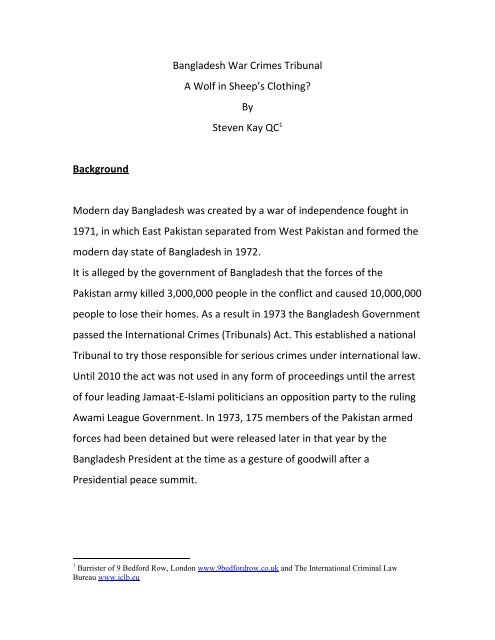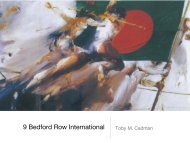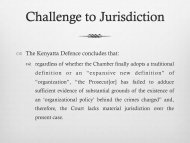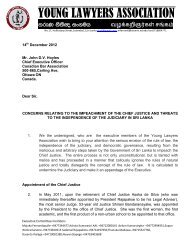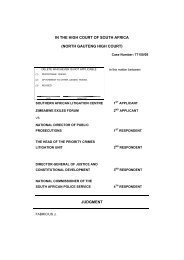Bangladesh War Crimes Tribunal A Wolf in Sheep's Clothing? - The ...
Bangladesh War Crimes Tribunal A Wolf in Sheep's Clothing? - The ...
Bangladesh War Crimes Tribunal A Wolf in Sheep's Clothing? - The ...
You also want an ePaper? Increase the reach of your titles
YUMPU automatically turns print PDFs into web optimized ePapers that Google loves.
<strong>Bangladesh</strong> <strong>War</strong> <strong>Crimes</strong> <strong>Tribunal</strong><br />
A <strong>Wolf</strong> <strong>in</strong> Sheep’s Cloth<strong>in</strong>g<br />
By<br />
Steven Kay QC 1<br />
Background<br />
Modern day <strong>Bangladesh</strong> was created by a war of <strong>in</strong>dependence fought <strong>in</strong><br />
1971, <strong>in</strong> which East Pakistan separated from West Pakistan and formed the<br />
modern day state of <strong>Bangladesh</strong> <strong>in</strong> 1972.<br />
It is alleged by the government of <strong>Bangladesh</strong> that the forces of the<br />
Pakistan army killed 3,000,000 people <strong>in</strong> the conflict and caused 10,000,000<br />
people to lose their homes. As a result <strong>in</strong> 1973 the <strong>Bangladesh</strong> Government<br />
passed the International <strong>Crimes</strong> (<strong>Tribunal</strong>s) Act. This established a national<br />
<strong>Tribunal</strong> to try those responsible for serious crimes under <strong>in</strong>ternational law.<br />
Until 2010 the act was not used <strong>in</strong> any form of proceed<strong>in</strong>gs until the arrest<br />
of four lead<strong>in</strong>g Jamaat‐E‐Islami politicians an opposition party to the rul<strong>in</strong>g<br />
Awami League Government. In 1973, 175 members of the Pakistan armed<br />
forces had been deta<strong>in</strong>ed but were released later <strong>in</strong> that year by the<br />
<strong>Bangladesh</strong> President at the time as a gesture of goodwill after a<br />
Presidential peace summit.<br />
1 Barrister of 9 Bedford Row, London www.9bedfordrow.co.uk and <strong>The</strong> International Crim<strong>in</strong>al Law<br />
Bureau www.iclb.eu
<strong>The</strong> International <strong>Crimes</strong> (<strong>Tribunal</strong>s) Amendment Act 1973/2009 & Rules<br />
of Procedure 2010 2<br />
<strong>The</strong> International <strong>Crimes</strong> (<strong>Tribunal</strong>s) Act 1973 was amended to become the<br />
International <strong>Crimes</strong> (<strong>Tribunal</strong>s) (Amendment) Act 2009. It created a<br />
<strong>Tribunal</strong> “for the detention, prosecution and punishment of persons for<br />
genocide, crimes aga<strong>in</strong>st humanity, war crimes and other crimes under<br />
<strong>in</strong>ternational law” and imported <strong>in</strong>ternationally recognized crimes <strong>in</strong>to the<br />
laws of <strong>Bangladesh</strong>.<br />
(a) Jurisdiction<br />
Section 3 gives the <strong>Tribunal</strong> jurisdiction over crimes committed before or<br />
after the commencement of the Act.<br />
By section 3(1) A tribunal shall have the power to try and punish any<br />
<strong>in</strong>dividual or group of <strong>in</strong>dividuals, or any member of any armed, defence or<br />
auxiliary forces, irrespective of his nationality, who commits or has<br />
committed, <strong>in</strong> the territory of <strong>Bangladesh</strong>, whether before of after the<br />
commencement of this Act, any of the crimes mentioned <strong>in</strong> subsection (2).<br />
<strong>Bangladesh</strong> First Constitutional Amendments 1973<br />
Article 47 (3) was <strong>in</strong>troduced <strong>in</strong>to the Constitution <strong>in</strong> 1973 and provided<br />
that members of armed, defence or auxillary forces or prisoners of war<br />
deta<strong>in</strong>ed or charged under any law or provision with genocide, crimes<br />
2 Section 22 of the ICTA 1973 gave the power to court to regulate its own procedure
aga<strong>in</strong>st humanity, war crimes or other crimes of <strong>in</strong>ternational law which<br />
was <strong>in</strong>consistent or repugnant to the Constitution, those laws or<br />
provisions could not be challenged as be<strong>in</strong>g void or unlawful. 3 This<br />
amendment had the effect of withdraw<strong>in</strong>g constitutional rights from a<br />
particular group of people with<strong>in</strong> <strong>Bangladesh</strong> society who were not even<br />
convicted but at the most were only suspected of such crimes and who<br />
could have been deta<strong>in</strong>ed without the requirement of suspicion. 4 <strong>The</strong>se<br />
crimes were <strong>in</strong>ternational crimes which did not previously exist with<strong>in</strong> the<br />
<strong>Bangladesh</strong> crim<strong>in</strong>al laws and were be<strong>in</strong>g imported to deal with events<br />
aris<strong>in</strong>g from the war of <strong>in</strong>dependence as part of the doctr<strong>in</strong>e of universality<br />
of such crimes.<br />
Under newly <strong>in</strong>troduced Constitution Article 47A(1) 5 other guaranteed<br />
constitutional rights were also explicitly withdrawn from such people. 6<br />
3 Article 47.(3) Notwithstand<strong>in</strong>g anyth<strong>in</strong>g conta<strong>in</strong>ed <strong>in</strong> this Constitution, no law nor any provision<br />
thereof provid<strong>in</strong>g for detention, prosecution or punishment of any person, who is a member<br />
of any armed or defence or auxiliary forces or who is a prisoner of war, for genocide, crimes<br />
aga<strong>in</strong>st humanity or war crimes and other crimes under <strong>in</strong>ternational law shall be deemed<br />
void or unlawful, or ever to have become void or unlawful, on the ground that such law or<br />
provision of any such law is <strong>in</strong>consistent with, or repugnant to any of the provisions of this<br />
Constitution.<br />
4 ICTAA 2009 Section 8.(3), (4), (5)<br />
8.(3) Any Investigation Officer mak<strong>in</strong>g an <strong>in</strong>vestigation under this Act may, by order <strong>in</strong> writ<strong>in</strong>g, require the<br />
attendance before himself of any person who appears to be acqua<strong>in</strong>ted with the circumstances of the case;<br />
and such person shall attend as so required.<br />
8.(4) Any Investigation Officer mak<strong>in</strong>g an <strong>in</strong>vestigation under this Act may exam<strong>in</strong>e orally any person who<br />
appears to be acqua<strong>in</strong>ted with the facts and circumstances of the case.<br />
8.(5) Such person shall be bound to answer all questions put to him by an Investigation Officer and shall<br />
not be excused from answer<strong>in</strong>g any question on the ground that the answer to such question will crim<strong>in</strong>ate,<br />
or may tend directly or <strong>in</strong>directly to crim<strong>in</strong>ate, such person: Provided that no such answer, which a person<br />
shall be compelled to give, shall subject him to any arrest or prosecution, or be proved<br />
aga<strong>in</strong>st him <strong>in</strong> any crim<strong>in</strong>al proceed<strong>in</strong>g.<br />
5 47(A)(1) <strong>The</strong> rights guaranteed under article 31. clauses (1) and (3) of article 35 and article 44<br />
shall not apply to any person to whom a law specified <strong>in</strong> clause (3) of article 47 applies.<br />
6 Article 31. Right to protection of law.<br />
To enjoy the protection of the law, and to be treated <strong>in</strong> accordance with law, and only <strong>in</strong><br />
accordance with law, is the <strong>in</strong>alienable right of every citizen, wherever he may be, and of<br />
every other person for the time be<strong>in</strong>g with<strong>in</strong> <strong>Bangladesh</strong>, and <strong>in</strong> particular no action detrimental<br />
to the life, liberty, body, reputation or property of any person shall be taken except <strong>in</strong>
<strong>The</strong>se were the rights given to every citizen of the protection of the law;<br />
the universal right of nullem crimen s<strong>in</strong>e lege (no crime without there be<strong>in</strong>g<br />
a law <strong>in</strong> force at the time); and the right to an expeditious trial by an<br />
<strong>in</strong>dependent and impartial court or tribunal. By new Article 47A(2) 7 these<br />
persons deta<strong>in</strong>ed or suspected or charged were also specifically denied the<br />
right to seek remedies available under the Constitution from the Supreme<br />
Court of <strong>Bangladesh</strong>.<br />
<strong>The</strong> overall effect of these measures was to put persons questioned,<br />
deta<strong>in</strong>ed, suspected of committ<strong>in</strong>g crimes or charged with crimes with<strong>in</strong><br />
the International <strong>Crimes</strong> (<strong>Tribunal</strong>) Act 1973 outside the norms of the<br />
national legal system. For the first time <strong>in</strong>equality had been <strong>in</strong>troduced <strong>in</strong>to<br />
the <strong>Bangladesh</strong> justice system by the Constitution that claimed to promote<br />
equality.<br />
accordance with law.<br />
Article 35. Protection <strong>in</strong> respect of trial and punishment.<br />
(1) No person shall be convicted to any offence except for violation of a law <strong>in</strong> force at the<br />
time of the commission of the act charged as an offence, nor be subjected to a penalty<br />
greater than, or different from that which might have been <strong>in</strong>flicted under the law <strong>in</strong> force at<br />
the time of the commission of the offence.<br />
(3) Every person accused of a crim<strong>in</strong>al offence shall have the right to a speedy and public<br />
trial by an <strong>in</strong>dependent and impartial court or tribunal established by law.<br />
Article 44. Enforcement of fundamental rights.<br />
(1) <strong>The</strong> right to move the High Court Division <strong>in</strong> accordance with clause (I) of article 102<br />
for the enforcement of the rights conferred by this Part of guaranteed.<br />
(2) Without prejudice to the powers of the High Court Division under article 102, Parliament<br />
may be law empower any other court, with<strong>in</strong> the local limits of its jurisdiction, to exercise<br />
all or any of those powers.<br />
7 47(A)(2) Notwithstand<strong>in</strong>g anyth<strong>in</strong>g conta<strong>in</strong>ed <strong>in</strong> this Constitution, no person to whom a law specified<br />
<strong>in</strong> clause (3) of article 47 applies shall have the right to move the Supreme Court for<br />
any of the remedies under this Constitution.
<strong>The</strong> <strong>Crimes</strong> <strong>in</strong> section 3(2)(a) these are def<strong>in</strong>ed as be<strong>in</strong>g:<br />
<strong>Crimes</strong> aga<strong>in</strong>st Humanity namely, murder, exterm<strong>in</strong>ation, enslavement,<br />
deportation, imprisonment, abduction, conf<strong>in</strong>ement, torture, rape or other<br />
<strong>in</strong>humane acts committed aga<strong>in</strong>st any civilian population or persecutions on<br />
political, racial, ethnic or religious grounds, whether or not <strong>in</strong> violation of<br />
the domestic law of the country where perpetrated;<br />
<strong>Crimes</strong> aga<strong>in</strong>st Peace namely, plann<strong>in</strong>g, preparation, <strong>in</strong>itiation or wag<strong>in</strong>g of<br />
a war of aggression or a war <strong>in</strong> violation of <strong>in</strong>ternational treaties,<br />
agreements or assurances;<br />
Genocide mean<strong>in</strong>g and <strong>in</strong>clud<strong>in</strong>g any of the follow<strong>in</strong>g acts committed with<br />
<strong>in</strong>tent to destroy, <strong>in</strong> whole or <strong>in</strong> part, a national, ethnic, racial, religious or<br />
political group, such as:<br />
(i) kill<strong>in</strong>g members of the group;<br />
(ii) caus<strong>in</strong>g serious bodily or mental harm to members of the group;<br />
(iii) deliberately <strong>in</strong>flict<strong>in</strong>g on the group conditions of life calculated to<br />
br<strong>in</strong>g about its physical destruction <strong>in</strong> whole or <strong>in</strong> part;<br />
(iv) impos<strong>in</strong>g measures <strong>in</strong>tended to prevent births with<strong>in</strong> the group;<br />
(v) forcibly transferr<strong>in</strong>g children of the group to another group;<br />
<strong>War</strong> <strong>Crimes</strong> namely, violation of laws or customs of war which <strong>in</strong>clude but<br />
are not limited to murder, ill‐treatment or deportation to slave labour or for<br />
any other purpose of civilian population <strong>in</strong> the territory of <strong>Bangladesh</strong>;<br />
murder or ill‐treatment of prisoners of war or persons on the seas, kill<strong>in</strong>g of
hostages and detenues, plunder of public or private property, wanton<br />
destruction of cities, towns or villages, or devastation not justified by<br />
military necessity;<br />
Violation of Geneva Conventions of 1949 of any humanitarian rules<br />
applicable <strong>in</strong> armed conflicts laid down <strong>in</strong> the Conventions;<br />
Any other crimes under <strong>in</strong>ternational law;<br />
Attempt, abetment or conspiracy to commit any such crimes;<br />
Complicity <strong>in</strong> or failure to prevent commission of any such crimes.<br />
<strong>The</strong> crimes with<strong>in</strong> Section 3 have been def<strong>in</strong>ed by many <strong>in</strong>ternational<br />
courts s<strong>in</strong>ce 1993 when the UN Security Council established the<br />
International Crim<strong>in</strong>al <strong>Tribunal</strong> for the Former Yugoslavia 8 . This was the first<br />
of the many <strong>in</strong>ternational crim<strong>in</strong>al courts and tribunals that have now been<br />
established and the def<strong>in</strong>itions of these crimes have been more carefully<br />
revised from the model of the Nuremberg Charter from which the ICTAA<br />
2009 is derived. 9<br />
By Presidential Order No.16 of 1973, the liberat<strong>in</strong>g forces were given<br />
immunity from prosecution under the ICTA 1973. <strong>The</strong> objects of the<br />
prosecutions were thereby def<strong>in</strong>ed as be<strong>in</strong>g only those from the Pakistan<br />
forces. <strong>The</strong> amendments to the Act <strong>in</strong> 2009 did not <strong>in</strong>corporate the<br />
Presidential decree so as to show with transparency the full terms of this<br />
8 UN SC/Res 827 of 1993<br />
9 For Example: ICC Statute Article 7 - <strong>Crimes</strong> aga<strong>in</strong>st humanity require the context of be<strong>in</strong>g “with the<br />
knowledge of a widespread or systematic attack aga<strong>in</strong>st a civilian population”
statute. This is a clear attempt to hoodw<strong>in</strong>k the <strong>in</strong>ternational community<br />
<strong>in</strong>to believ<strong>in</strong>g these are impartial laws. In fact, there can be no clearer<br />
<strong>in</strong>dication of the <strong>in</strong>tention to apply these legal procedures <strong>in</strong> a<br />
discrim<strong>in</strong>atory way and <strong>in</strong> defiance of the constitutional duties to equality. 10<br />
(b) Liability for crimes<br />
Section 4 sets out the def<strong>in</strong>ition of jo<strong>in</strong>t crim<strong>in</strong>al liability and command<br />
responsibility.<br />
As to jo<strong>in</strong>t liability it does not dist<strong>in</strong>guish between offence and crime and so<br />
the extent of <strong>in</strong>tended crim<strong>in</strong>al liability is unclear:<br />
4. (1) When any crime as specified <strong>in</strong> section 3 is committed by several<br />
persons, each of such person is liable for that crime <strong>in</strong> the same manner as<br />
if it were done by him alone.<br />
In relation to command responsibility the level of knowledge when<br />
connected with “plans and activities <strong>in</strong>volv<strong>in</strong>g the commission of such<br />
crimes” is also unclear.<br />
4. (2) Any commander or superior officer who orders, permits,<br />
acquiesces or participates <strong>in</strong> the commission of any of the crimes<br />
specified <strong>in</strong> section 3 or is connected with any plans and activities<br />
<strong>in</strong>volv<strong>in</strong>g the commission of such crimes or who fails or omits to<br />
discharge his duty to ma<strong>in</strong>ta<strong>in</strong> discipl<strong>in</strong>e, or to control or supervise<br />
10 Article 27
the actions of the persons under his command or his subord<strong>in</strong>ates,<br />
whereby such persons or subord<strong>in</strong>ates or any of them commit any<br />
such crimes, or who fails to take necessary measures to prevent the<br />
commission of such crimes, is guilty of such crimes.<br />
(c) Official Position<br />
5. (1) <strong>The</strong> official position, at any time, of an accused shall not be<br />
considered free<strong>in</strong>g him from responsibility or mitigat<strong>in</strong>g punishment.<br />
(2) <strong>The</strong> fact that the accused acted pursuant to his domestic law or to order<br />
of his Government or of a superior shall not free him from responsibility,<br />
but may be considered <strong>in</strong> mitigation of punishment if the <strong>Tribunal</strong> deems<br />
that justice so requires.<br />
(d) <strong>The</strong> <strong>Tribunal</strong><br />
6. (1) For the purpose of section 3, the Government may, by notification <strong>in</strong><br />
the official Gazette, set up one or more <strong>Tribunal</strong>s, each consist<strong>in</strong>g of a<br />
Chairman and not less than two and not more than four other members.<br />
(4) If any member of a <strong>Tribunal</strong> dies or is, due to illness or any<br />
other reason, unable to cont<strong>in</strong>ue to perform his functions, the<br />
Government may, by notification <strong>in</strong> the official Gazette, declare the<br />
office of such member to be vacant and appo<strong>in</strong>t thereto another<br />
person qualified to hold the office.<br />
(5) If, <strong>in</strong> the course of a trial, any one of the members of a<br />
<strong>Tribunal</strong> is, for any reason, unable to attend any sitt<strong>in</strong>g thereof, the
trial may cont<strong>in</strong>ue before the other members.<br />
(6) A <strong>Tribunal</strong> shall not, merely by reason of any change <strong>in</strong> its<br />
membership or the absence of any member thereof from any sitt<strong>in</strong>g,<br />
be bound to recall and re‐hear any witness who has already given<br />
any evidence and may act on the evidence already given or<br />
produced before it.<br />
(8) Neither the constitution of a <strong>Tribunal</strong> nor the appo<strong>in</strong>tment of its<br />
Chairman or members shall be challenged by the prosecution or by the<br />
accused persons or their counsel.<br />
Conflicts of <strong>in</strong>terest or bias or prejudice or bad behavior of any Judge may<br />
not be raised by the parties <strong>in</strong> order to challenge the fairness and<br />
impartiality of the trial. <strong>The</strong> <strong>Bangladesh</strong> Constitution Article 35(3) which<br />
was <strong>in</strong> accordance with ICCPR Article 14.1 and UDHR Article 10 giv<strong>in</strong>g the<br />
right to be tried by an <strong>in</strong>dependent and impartial court or tribunal was<br />
amended <strong>in</strong> 1973 so that this right was withdrawn from these cases. 11 New<br />
Articles 47(3) or 47A(2) of the Constitution prevents challenge <strong>in</strong> the<br />
Supreme Court to enforce rights normally with<strong>in</strong> the Constitution. <strong>The</strong>se<br />
restrictions are also relevant to ICTAA 2009 sections 6(4), 6(5) and 6(6)<br />
which permits proceed<strong>in</strong>gs to cont<strong>in</strong>ue notwithstand<strong>in</strong>g the absence of a<br />
Judge as well as the substitution of a Judge <strong>in</strong> the event of <strong>in</strong>disposition due<br />
to death or illness. 12 It is very clear that such arrangements dur<strong>in</strong>g an<br />
11 Article 47A(1) 1973 amendment to the Constitution. See also ICCPR Article 14.1 and UDHR Article 10<br />
12 6(4) If any member of a <strong>Tribunal</strong> dies or is, due to illness or any other reason, unable to cont<strong>in</strong>ue to<br />
perform his functions, the Government may, by notification <strong>in</strong> the official Gazette, declare the<br />
office of such member to be vacant and appo<strong>in</strong>t thereto another person qualified to hold the office.<br />
6(5) If, <strong>in</strong> the course of a trial, any one of the members of a <strong>Tribunal</strong> is, for any reason, unable to attend any<br />
sitt<strong>in</strong>g thereof, the trial may cont<strong>in</strong>ue before the other members.
ongo<strong>in</strong>g trial may raise genu<strong>in</strong>e issues of capacity for a Judge to be able to<br />
try a case fairly <strong>in</strong> such circumstances. It would at least be <strong>in</strong> the <strong>in</strong>terests<br />
of justice for the court to provide justification and be held accountable for<br />
any decisions it made under these provisions<br />
<strong>The</strong> lack of right to challenge and <strong>in</strong>ability to request the <strong>Tribunal</strong> to be<br />
accountable for its conduct at the time of the trial can also be seen <strong>in</strong> ICTAA<br />
2009 section 10(h), which restricts the rights of parties to object or<br />
question a witness questioned by a Judge. 13 A party may have good grounds<br />
for objection to the conduct or action of the <strong>Tribunal</strong> which may be unfair –<br />
for <strong>in</strong>stance if a question contrary to rules of evidence, is unfair, wrong <strong>in</strong><br />
fact, irrelevant to the issues or mislead<strong>in</strong>g to the witness or capable of<br />
mis<strong>in</strong>terpretation.<br />
(e) Investigation<br />
8. (5) Such person shall be bound to answer all questions put to him<br />
by an Investigation Officer and shall not be excused from answer<strong>in</strong>g<br />
any question on the ground that the answer to such question will<br />
crim<strong>in</strong>ate, or may tend directly or <strong>in</strong>directly to crim<strong>in</strong>ate, such<br />
person: Provided that no such answer, which a person shall be compelled<br />
to give, shall subject him to any arrest or prosecution, or be proved<br />
6(6) A <strong>Tribunal</strong> shall not, merely by reason of any change <strong>in</strong> its membership or the absence of any member<br />
thereof from any sitt<strong>in</strong>g, be bound to recall and re-hear any witness who has already given any evidence<br />
and may act on the evidence already given or produced before it.<br />
13 10(h) the <strong>Tribunal</strong> may, <strong>in</strong> order to discover or obta<strong>in</strong> proof of relevant facts, ask any witness any<br />
question it pleases, <strong>in</strong> any form and at any time about any fact; and may order production of any document<br />
or th<strong>in</strong>g or summon any witness, and neither the prosecution nor the defence shall be entitled either to make<br />
any objection to any such question or order or, without the leave of the <strong>Tribunal</strong>, to cross-exam<strong>in</strong>e any<br />
witness upon any answer given <strong>in</strong> reply to any such question.
aga<strong>in</strong>st him <strong>in</strong> any crim<strong>in</strong>al proceed<strong>in</strong>g.<br />
Although section 8.5 14 restricts the effect of such question<strong>in</strong>g to the<br />
provision of <strong>in</strong>formation, as it is now 40 years s<strong>in</strong>ce the events concerned<br />
there can be no justification based upon national emergency to support<br />
such a rule. <strong>The</strong> <strong>Bangladesh</strong> Code of Crim<strong>in</strong>al Procedure section 161 (2),<br />
provides for protection aga<strong>in</strong>st self‐<strong>in</strong>crim<strong>in</strong>ation with<strong>in</strong> the national<br />
crim<strong>in</strong>al law of <strong>Bangladesh</strong> and this is an example of the divergent<br />
standards of justice. 15<br />
(f) Commencement of Proceed<strong>in</strong>gs<br />
9. (3) <strong>The</strong> Chief Prosecutor shall, at least three weeks before the<br />
commencement of the trial, furnish to the <strong>Tribunal</strong> a list of witnesses<br />
<strong>in</strong>tended to be produced along with the recorded statement of such<br />
witnesses or copies thereof and copies of documents which the<br />
prosecution <strong>in</strong>tends to rely upon <strong>in</strong> support of such charges.<br />
(5) A list of witnesses for the defence, if any, along with the<br />
documents or copies thereof, which the defence <strong>in</strong>tends to rely<br />
upon, shall be furnished to the <strong>Tribunal</strong> and the prosecution at the time of<br />
the commencement of the trial.<br />
14 8(5) Such person shall be bound to answer all questions put to him by an Investigation Officer and shall<br />
not be excused from answer<strong>in</strong>g any question on the ground that the answer to such question will crim<strong>in</strong>ate,<br />
or may tend directly or <strong>in</strong>directly to crim<strong>in</strong>ate, such person. Provided that no such answer, which a person<br />
shall be compelled to give, shall subject him to any arrest or prosecution, or be proved aga<strong>in</strong>st him <strong>in</strong> any<br />
crim<strong>in</strong>al proceed<strong>in</strong>g.<br />
15 161.(1) Any police-officer mak<strong>in</strong>g an <strong>in</strong>vestigation…, by general or special order, … may exam<strong>in</strong>e<br />
orally any person supposed to be acqua<strong>in</strong>ted with the facts and circumstances of the case.<br />
(2) Such person shall be bound to answer all questions relat<strong>in</strong>g to such case put to him by such officer,<br />
other than questions the answers to which would have a tendency to expose him to a crim<strong>in</strong>al charge or to a<br />
penalty or forfeiture…
(g) Procedure of Trial<br />
Section 10:<br />
(h) the <strong>Tribunal</strong> may, <strong>in</strong> order to discover or obta<strong>in</strong> proof of<br />
relevant facts, ask any witness any question it pleases, <strong>in</strong> any form<br />
and at any time about any fact; and may order production of any<br />
document or th<strong>in</strong>g or summon any witness, and neither the prosecution<br />
nor the defence shall be entitled either to make any objection to any such<br />
question or order or, without the leave of the <strong>Tribunal</strong>, to cross‐exam<strong>in</strong>e<br />
any witness upon any answer given <strong>in</strong> reply to any such question;<br />
(i) the prosecution shall first sum up its case, and thereafter the<br />
defence shall sum up its case: Provided that if any witness is exam<strong>in</strong>ed by<br />
the defence, the prosecution shall have the right to sum up its case after<br />
the defence has done so;<br />
(h) Powers of <strong>Tribunal</strong><br />
Section 11:<br />
(2) For the purpose of enabl<strong>in</strong>g any accused person to expla<strong>in</strong> any<br />
circumstances appear<strong>in</strong>g <strong>in</strong> the evidence aga<strong>in</strong>st him, a <strong>Tribunal</strong> may, at<br />
any stage of the trial without previously warn<strong>in</strong>g the accused person, put<br />
such questions to him as the <strong>Tribunal</strong> considers necessary: Provided that<br />
the accused person shall not render himself liable to punishment by<br />
refus<strong>in</strong>g to answer such questions or by giv<strong>in</strong>g false answers to them; but<br />
the <strong>Tribunal</strong> may draw such <strong>in</strong>ference from such refusal or answers as it<br />
th<strong>in</strong>ks just.
This offends aga<strong>in</strong>st an accused’s right of silence and can be considered as a<br />
measure to compel an accused to testify.<br />
(I) Rules of Evidence<br />
By Section 19 the ICT will adopt standards for the admission of evidence<br />
not recognised by the national courts.<br />
19. (1) A <strong>Tribunal</strong> shall not be bound by technical rules of evidence; and it<br />
shall adopt and apply to the greatest possible extent expeditious and nontechnical<br />
procedure, and may admit any evidence, <strong>in</strong>clud<strong>in</strong>g reports and<br />
photographs published <strong>in</strong> newspapers, periodicals and magaz<strong>in</strong>es, films and<br />
tape‐record<strong>in</strong>gs and other materials as may be tendered before it, which it<br />
deems to have probative value.<br />
(2) A <strong>Tribunal</strong> may receive <strong>in</strong> evidence any statement recorded by a<br />
Magistrate or an Investigation Officer be<strong>in</strong>g a statement made by any<br />
person who, at the time of the trial, is dead or whose attendance cannot be<br />
procured without an amount of delay or expense which the <strong>Tribunal</strong><br />
considers unreasonable.<br />
(3) A <strong>Tribunal</strong> shall not require proof of facts of common knowledge<br />
but shall take judicial notice thereof.<br />
(4) A <strong>Tribunal</strong> shall take judicial notice of official governmental documents<br />
and reports of the United Nations and its subsidiary agencies or other<br />
<strong>in</strong>ternational bodies <strong>in</strong>clud<strong>in</strong>g non‐governmental organisations.
<strong>The</strong>re is an additional evidence procedure relevant to the removal of<br />
national rules from these proceed<strong>in</strong>gs.<br />
Section 23. <strong>The</strong> provisions of the Crim<strong>in</strong>al Procedure Code, 1898 (V of<br />
1898), and the Evidence Act, 1872 (I of 1872), shall not apply <strong>in</strong> any<br />
proceed<strong>in</strong>gs under this Act.<br />
<strong>The</strong> removal of the Crim<strong>in</strong>al Procedure Code 1898 and the Evidence Act<br />
1872, from the proceed<strong>in</strong>gs under the ICTAA 2009 emphasises the capacity<br />
for unfairness <strong>in</strong> these trials.<br />
Normal rules for judicial notice under section 57 of the Evidence Act 16 have<br />
been altered <strong>in</strong> section 19(3) 17 but significantly under section 19(4):<br />
“A <strong>Tribunal</strong> shall take judicial notice of official governmental documents<br />
and reports of the United Nations and its subsidiary agencies or other<br />
<strong>in</strong>ternational bodies <strong>in</strong>clud<strong>in</strong>g non‐governmental organizations”.<br />
This equates such documents with the facts of common knowledge that<br />
give arise for judicial notice. <strong>The</strong>refore government documents and reports<br />
are given the status of evidence automatically and without capacity for<br />
challenge and scrut<strong>in</strong>y of content. This becomes a powerful tool <strong>in</strong> the<br />
16 i. <strong>The</strong> laws of <strong>Bangladesh</strong>; ii. Articles of <strong>War</strong> for the Armed Forces; iii. Course of proceed<strong>in</strong>gs of<br />
Parliament; iv. <strong>The</strong> seals of the Courts; v. <strong>The</strong> accession to officce, names, titles, functions, and signatures<br />
persons <strong>in</strong> public office, if such appo<strong>in</strong>tment is notified <strong>in</strong> the official gazette. vi. Existence, title and<br />
national flag of every sovereign vii. division of time, geographical divisions and public festivals<br />
viii. <strong>The</strong> territories of <strong>Bangladesh</strong> ix. Commencement, cont<strong>in</strong>uance and term<strong>in</strong>ation of hostilities between<br />
<strong>Bangladesh</strong> and another State. x. Names of officers of the Courts xi. Rules of the road, land or sea<br />
17 19.3 A <strong>Tribunal</strong> shall not require proof of facts of common knowledge but shall take judicial notice<br />
thereof.
hands of the Government which may well be <strong>in</strong>tentioned to present its<br />
picture of events at the expense of the truth.<br />
Also at section 26:<br />
26. <strong>The</strong> provisions of this Act shall have effect notwithstand<strong>in</strong>g anyth<strong>in</strong>g<br />
<strong>in</strong>consistent therewith conta<strong>in</strong>ed <strong>in</strong> any other law for the time be<strong>in</strong>g <strong>in</strong><br />
force.<br />
At Section 22:<br />
<strong>The</strong> <strong>Tribunal</strong> regulates its own procedure<br />
(j) Judgment and Sentence<br />
By Section 20 the Death penalty is reta<strong>in</strong>ed.<br />
20. (1) <strong>The</strong> Judgement of a <strong>Tribunal</strong> as to the guilt or the <strong>in</strong>nocence of any<br />
accused person shall give the reasons on which it is based: Provided that<br />
each member of the <strong>Tribunal</strong> shall be competent to deliver a judgement of<br />
his own.<br />
(2) Upon conviction of an accused person, the <strong>Tribunal</strong> shall award<br />
sentence of death or such other punishment proportionate to the<br />
gravity of the crime as appears to the <strong>Tribunal</strong> to be just and<br />
proper.<br />
(3) <strong>The</strong> sentence awarded under this Act shall be carried out <strong>in</strong> accordance<br />
with the orders of the Government.
(k) Burden of Proof<br />
<strong>The</strong> International <strong>Crimes</strong> <strong>Tribunal</strong> Rules of Procedure 2010, Rule 50<br />
provides for the burden of proof to be on the Prosecution. However, this is<br />
not the case <strong>in</strong> all aspects of the trial. Rule 51(1) 18 requires the Defence to<br />
prove alibi, if it is relied upon, and any particular fact or <strong>in</strong>formation which<br />
is <strong>in</strong> its possession or knowledge. This is <strong>in</strong> conflict with the presumption of<br />
<strong>in</strong>nocence and the burden of proof be<strong>in</strong>g upon the prosecution as set out<br />
clearly <strong>in</strong> ICCPR at Article 14.2 as a universally recognized pr<strong>in</strong>ciple of law. 19<br />
If an Accused raises alibi the burden still rema<strong>in</strong>s upon the Prosecution to<br />
prove its case and disprove the alibi. This also applies to other facts or<br />
<strong>in</strong>formation raised by the Defence. If the Prosecution fails adequately to<br />
<strong>in</strong>vestigate a case and is concerned to prove only what it believes rather<br />
than to search for the truth, this Rule would cause the Defence to have the<br />
entire burden of prov<strong>in</strong>g <strong>in</strong>nocence.<br />
Of particular concern here is the delay <strong>in</strong> proceed<strong>in</strong>gs which will impose<br />
restrictions on the ability of the Defence to prove <strong>in</strong>nocence aris<strong>in</strong>g from<br />
facts which were <strong>in</strong> existence nearly 40 years ago. <strong>The</strong> charges will be<br />
brought by an accuser and it is that party that has to prove the case beyond<br />
reasonable doubt.<br />
18 51. (1) <strong>The</strong> onus of proof as to the plea of ‘alibi’ or to any particular fact or <strong>in</strong>formation which is <strong>in</strong> the<br />
possession or knowledge of the defence shall be upon the defence.<br />
19 14.2. Everyone charged with a crim<strong>in</strong>al offence shall have the right to be presumed <strong>in</strong>nocent until proved<br />
guilty accord<strong>in</strong>g to law.
(l) Trials <strong>in</strong> Absentia<br />
<strong>The</strong>re is a provision <strong>in</strong> the Rules for trials <strong>in</strong> absentia.<br />
Rule 32: If the accused, despite publication of notice <strong>in</strong> daily news<br />
papers, fails to appear before the <strong>Tribunal</strong> on the date and time so<br />
specified there<strong>in</strong>, and the <strong>Tribunal</strong> has reason to believe that the<br />
accused has absconded or conceal<strong>in</strong>g himself so that he cannot be<br />
arrested and produced for trial and there is no immediate prospect for<br />
arrest<strong>in</strong>g him, the trial of such accused shall commence and be held <strong>in</strong><br />
absentia.<br />
However, no mechanism exists by which an accused who is<br />
subsequently apprehended may challenge such a verdict, other than an<br />
appeal to the Supreme Court of <strong>Bangladesh</strong> under Article 21 which has<br />
to be made with<strong>in</strong> 60 days of conviction and sentence.<br />
<strong>Bangladesh</strong> – International Treaties<br />
<strong>Bangladesh</strong> ratified the Treaty of Rome on 23 March 2010 and thereby<br />
became a State party member of the International Crim<strong>in</strong>al Court. <strong>The</strong><br />
Statute and Rules of Procedure and Evidence for the ICC conta<strong>in</strong> modern<br />
and <strong>in</strong>ternationally recognized pr<strong>in</strong>ciples that form the norms for the trial<br />
of the <strong>in</strong>ternational crimes. On 6 September 2000 the Government of<br />
<strong>Bangladesh</strong> acceded to the International Covenant on Civil and Political
Rights by which it agreed to uphold universal pr<strong>in</strong>ciples for the fairness of<br />
crim<strong>in</strong>al trials with<strong>in</strong> its national jurisdiction.<br />
By Article 14 of the ICCPR, <strong>Bangladesh</strong> affirmed, <strong>in</strong>ter alia, that:<br />
14.1. All persons shall be equal before the courts and tribunals. In the<br />
determ<strong>in</strong>ation of any crim<strong>in</strong>al charge aga<strong>in</strong>st him, or of his rights and<br />
obligations <strong>in</strong> a suit at law, everyone shall be entitled to a fair and public<br />
hear<strong>in</strong>g by a competent, <strong>in</strong>dependent and impartial tribunal established by<br />
law…<br />
and<br />
14.2. Everyone charged with a crim<strong>in</strong>al offence shall have the right to be<br />
presumed <strong>in</strong>nocent until proved guilty accord<strong>in</strong>g to law.<br />
and<br />
14.3(e) To exam<strong>in</strong>e, or have exam<strong>in</strong>ed, the witnesses aga<strong>in</strong>st him and to<br />
obta<strong>in</strong> the attendance and exam<strong>in</strong>ation of witnesses on his behalf under the<br />
same conditions as witnesses aga<strong>in</strong>st him;<br />
and<br />
14.3(g) Not to be compelled to testify aga<strong>in</strong>st himself and confess his guilt;<br />
By Article 15:<br />
15.1 . No one shall be held guilty of any crim<strong>in</strong>al offence on account of any<br />
act or omission which did not constitute a crim<strong>in</strong>al offence, under national<br />
or <strong>in</strong>ternational law, at the time when it was committed…<br />
15.2. Noth<strong>in</strong>g <strong>in</strong> this article shall prejudice the trial and punishment of any<br />
person for any act or omission which, at the time when it was committed,<br />
was crim<strong>in</strong>al accord<strong>in</strong>g to the general pr<strong>in</strong>ciples of law recognized by the<br />
community of nations.<br />
By Article 26:
All persons are equal before the law and are entitled without any<br />
discrim<strong>in</strong>ation to the equal protection of the law. In this respect, the law<br />
shall prohibit any discrim<strong>in</strong>ation and guarantee to all persons equal and<br />
effective protection aga<strong>in</strong>st discrim<strong>in</strong>ation on any ground such as race,<br />
colour, sex, language, religion, political or other op<strong>in</strong>ion, national or social<br />
orig<strong>in</strong>, property, birth or other status.<br />
<strong>The</strong> Universal Declaration of Human Rights also conta<strong>in</strong>s Articles directly<br />
relevant to these issues. Articles 8 20 , 9 21 , 10 22 and 11 23 all provide for<br />
fairness, freedom from arbitrar<strong>in</strong>ess, impartiality, presumption of<br />
<strong>in</strong>nocence and certa<strong>in</strong>ty for what amounts to crim<strong>in</strong>al conduct. <strong>The</strong> 1968<br />
United Nations International Conference on Human Rights agreed that the<br />
Declaration "constitutes an obligation for the members of the <strong>in</strong>ternational<br />
community" to protect and preserve the rights of its citizens. 24 <strong>The</strong><br />
Declaration provides a def<strong>in</strong>ition of the concepts of “fundamental<br />
freedoms" and "human rights" 25 <strong>in</strong>troduced by the UN Charter 26 , by which<br />
<strong>Bangladesh</strong> is legally bound. 27<br />
20 Article 8: Everyone has the right to an effective remedy by the competent national tribunals for acts<br />
violat<strong>in</strong>g the fundamental rights granted him by the constitution or by law.<br />
21 Article 9: No one shall be subjected to arbitrary arrest, detention or exile.<br />
22 Article 10: Everyone is entitled <strong>in</strong> full equality to a fair and public hear<strong>in</strong>g by an <strong>in</strong>dependent and<br />
impartial tribunal, <strong>in</strong> the determ<strong>in</strong>ation of his rights and obligations and of any crim<strong>in</strong>al charge aga<strong>in</strong>st him.<br />
23 Article 11:<br />
1. Everyone charged with a penal offence has the right to be presumed <strong>in</strong>nocent until proved guilty<br />
accord<strong>in</strong>g to law <strong>in</strong> a public trial at which he has had all the guarantees necessary for his defence.<br />
2. No one shall be held guilty of any penal offence on account of any act or omission which did not<br />
constitute a penal offence, under national or <strong>in</strong>ternational law, at the time when it was committed. Nor<br />
shall a heavier penalty be imposed than the one that was applicable at the time the penal offence was<br />
committed<br />
24 http://www.unac.org/rights/question.html<br />
25 <strong>The</strong> Declaration provides a cross-reference to the UN Charter <strong>in</strong> paragraphs 5 and 6 of the preamble<br />
26 <strong>The</strong>se concepts are <strong>in</strong>troduced <strong>in</strong> Chapter 1, Article 1 of the UN Charter,<br />
http://www.un.org/en/documents/charter/chapter1.shtml<br />
27 <strong>Bangladesh</strong> declared acceptance of the obligations conta<strong>in</strong>ed <strong>in</strong> the UN Charter on 17 September 1974.
<strong>The</strong> amendments made to the Constitution <strong>in</strong> 1973 which apply only to<br />
<strong>in</strong>ternational crimes not previously with<strong>in</strong> the <strong>Bangladesh</strong> national<br />
jurisdiction are <strong>in</strong> contradiction to the <strong>in</strong>ternationally recognized fair trial<br />
pr<strong>in</strong>ciples adopted by the State of <strong>Bangladesh</strong> and normally found with<strong>in</strong> its<br />
constitution. <strong>Bangladesh</strong> has imported crimes of universality <strong>in</strong>to its<br />
jurisdiction but exported the fundamental human rights from its<br />
constitution which are also universal.<br />
Steven Kay QC<br />
9 Bedford Row<br />
London<br />
13 October 2010


